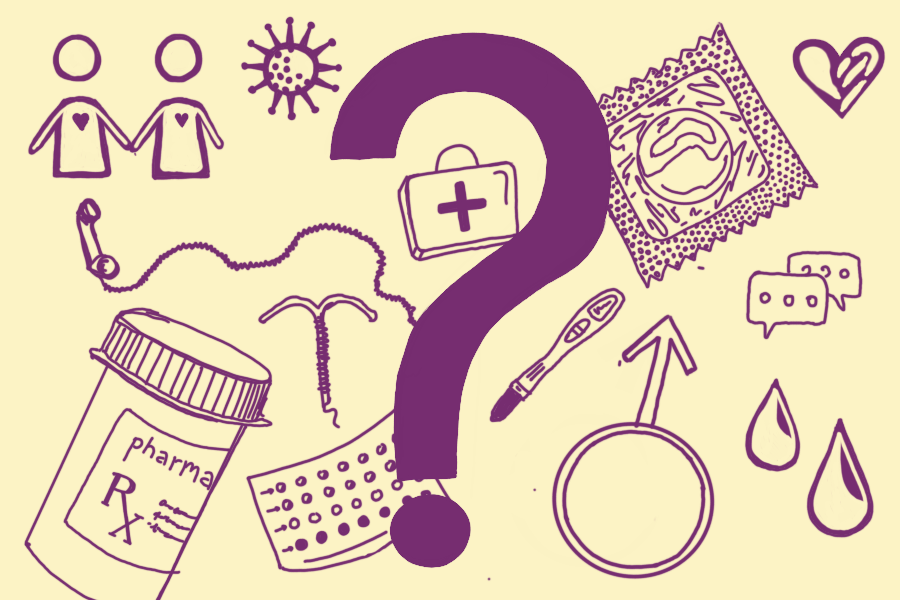Sexual health, sexuality resources on and off campus
Illustration by Audrey Hettleman
Northwestern and Evanston have a variety of resources available for sexual health and sexuality.
August 12, 2022
Leaving home and starting college grants independence to have new experiences and explore untapped facets of your identity. Sex and sexuality are often at the center of that exploration, but questions may arise.
In the third edition of “The Sex Lives of College Students,” published in 2021, University of Maine Prof. Sandra Caron surveyed nearly 7,000 college students and found that, despite the amount of sex we see in pop culture and media, many young adults are left with questions about it. She also noted friends are the most important influence on sexual attitudes, and few students felt their school played a significant role in their sexual development.
But Northwestern is equipped with physical and emotional sexual health resources to help you out.
The Center for Awareness, Response and Education
At CARE, students can find confidential support if they are impacted by sexual violence, relationship violence or stalking. Located in Searle Hall, CARE’s mission is to create a culture of healthy sexuality at NU where those crimes are not tolerated. It also supports the friends and partners of survivors.
CARE staff are available by appointment on weekdays from 8:30 a.m. to 5 p.m. They offer a safe space to process, ask questions and learn about the impact of trauma. CARE can also assist students through the Title IX process and provide referrals to legal and medical advocacy, free counseling and support groups. Speaking with CARE does not require you to make a report to the University, but it will explain what reporting would look like and present your options.
Besides supporting survivors, CARE answers questions regarding sexuality, hookups and relationships. Plenty of resources are available on its website as well, including guides to consent, contraceptives, masturbation and more. You canfind safe sex supplies such as condoms, lube and dental dams at the reception area on the third floor of Searle.
Sexual Health and Assault Peer Educators
SHAPE strives to create a culture of healthy sexuality with an informative, open dialogue on all things regarding sex while fighting rape culture. This student organization, affiliated with CARE, is survivor-centered, sex-positive and social justice-oriented, according to its website.
SHAPE organizes events, like roundtable discussions and film screenings, and provides presentations and workshops per request. You may encounter its members on Fridays at Norris University Center when they set up the “G-Spot,” a table where students can ask questions and get free condoms, lube, sex toys and informational pamphlets. You can also connect with SHAPE on Instagram @nushape to stay updated on its activities.
Northwestern Medicine Student Health Service
For physical sexual health support, students can make an appointment with the NU Medicine Student Health Service at Searle through its online health portal. It offers reproductive health examinations as well as confidential STI, HIV and pregnancy testing. Student health insurance covers these services, but there may be a copay. You can also pick up prescription birth control and next-day contraceptives at the pharmacy on the first floor of Searle.
Off-campus options
For additional support, check out the many helpful organizations in the Chicago area. Womencare Counseling & Training Center, located in Evanston on 1740 Ridge Ave., offers individual, relationship and family counseling with a specialty in trauma treatment. Chicago Women’s Health Center in the Uptown neighborhood provides physical examinations, testing, counseling and trans health services like hormone therapy. There are also multiple family-planning organizations and Planned Parenthood locations that can assist with pregnancy testing and abortion services.
Options for LGBTQ+ students
Multicultural Student Affairs manages support options for the LGBTQ+ community at NU, like the Gender and Sexuality Resource Center in Norris, but on-campus sexual health resources dedicated to this group are limited. Students have advocated for an expanded GSRC for more than a year and in April, Student Affairs identified plans to relocate to Foster-Walker Complex as a temporary solution, though this is still in progress. CARE, SHAPE and Searle will provide physical examinations and emotional support for all, but students will have to go off campus to find a sexual health center specifically for the LGBTQ+ community. Howard Brown Health Center, with several locations in Chicago, provides physical and emotional care for the LGBTQ+ community. Additionally, it posts a blog about LGBTQ+ health, covering topics like the recent monkeypox outbreak. Center on Halsted, a LGBTQ+ community center, also provides health services like free HIV and hepatitis C testing and behavioral health therapy.
No matter where your journey at NU takes you, don’t be afraid to ask questions and seek help for your sexual health.
Email: [email protected]
Twitter: @jennaanderson_1
Related Stories:
– Some students criticize Wildcat Welcome sexual health programming
– A guide to sexual health resources in Evanston, Chicago and beyond
– NU sexual health educators concerned about new federal Title IX regulations


